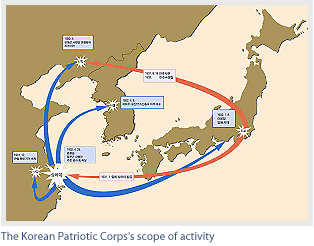

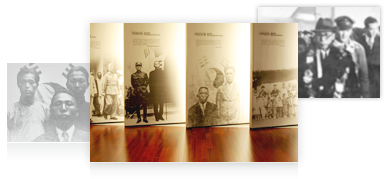
Activities with KPG (1919 ∼ 1932)
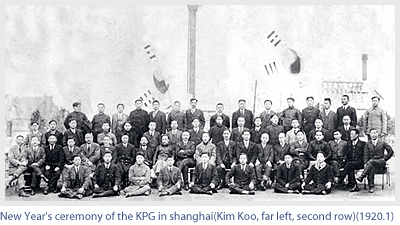 In connection with Korea's March First Independence Movement in 1919, Kim Koo was exiled to Shanghai where he participated in Korean provisional Government(KPG) activities. In the KPG he filled various posts, such as Police Bureau Commissioner in 1919, Minister of Internal Affairs in 1923, and Premier in 1926. He restructured the KPG's administrative system in 1927 and devoted himself to a letter campaign to Koreans living in the United States.
In connection with Korea's March First Independence Movement in 1919, Kim Koo was exiled to Shanghai where he participated in Korean provisional Government(KPG) activities. In the KPG he filled various posts, such as Police Bureau Commissioner in 1919, Minister of Internal Affairs in 1923, and Premier in 1926. He restructured the KPG's administrative system in 1927 and devoted himself to a letter campaign to Koreans living in the United States.
His efforts brought in funds for organizing the Korean Patriotic Corps. In 1932 he made elaborate preparations for the anti-Japanese acts of Yi Bong-chang and Yun Bong-gil.
Kim Koo and His Family
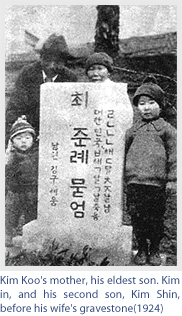 In 1920 his wife and his son came to live with him in Shanghai, China. In 1922 his mother came and his second son Kim Shin was born. This happy family life did not last long. His wife died in January 1924. In 1925 his mother and Shin, his second son, went back to Korea. Two years later when his elder son Kim In also went back to Korea, leaving him alone in exile.
In 1920 his wife and his son came to live with him in Shanghai, China. In 1922 his mother came and his second son Kim Shin was born. This happy family life did not last long. His wife died in January 1924. In 1925 his mother and Shin, his second son, went back to Korea. Two years later when his elder son Kim In also went back to Korea, leaving him alone in exile.
Paikbum Il Ji
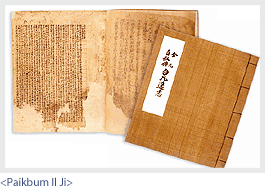 In 1928, Kim Koo started writing the Paikbum Il Ji (named after his pen name). Here he wrote of his commitment to anti-Japanese measures that would bring maximum effects with minimum resources, while also recording his personal and family histories with the intention of leaving a sort of written will to his two sons in Korea.
In 1928, Kim Koo started writing the Paikbum Il Ji (named after his pen name). Here he wrote of his commitment to anti-Japanese measures that would bring maximum effects with minimum resources, while also recording his personal and family histories with the intention of leaving a sort of written will to his two sons in Korea.
Korean Patriotic Corps
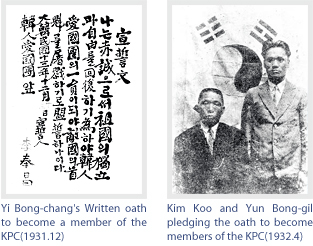 Kim Koo established the Korean Patriotic Corps (KPC) in 1931. Backed by the unilateral support of the KPG, he promoted radical steps such as dispatching KPC staff members to assassinate Japanese key figures at home and abroad and to blow up colonial government organizations. Two of their more effective acts were carried out by Yi Bong-chang, who threw a bomb at the Japanese emperor in Tokyo in January 1932, and Yun Bong-gil who bombed Hongkou Park, Shanghai in April 1932, killing Commander Shirakawa, who led the Japanese Army stationed in Shanghai, as well as other important Japanese figures. The KPC's patriotic acts such as these inspired hope in the Korean people for a national independence achieved by their own hands and also drew worldwide publicity about the Japanese brutalities conducted in Korea.
Kim Koo established the Korean Patriotic Corps (KPC) in 1931. Backed by the unilateral support of the KPG, he promoted radical steps such as dispatching KPC staff members to assassinate Japanese key figures at home and abroad and to blow up colonial government organizations. Two of their more effective acts were carried out by Yi Bong-chang, who threw a bomb at the Japanese emperor in Tokyo in January 1932, and Yun Bong-gil who bombed Hongkou Park, Shanghai in April 1932, killing Commander Shirakawa, who led the Japanese Army stationed in Shanghai, as well as other important Japanese figures. The KPC's patriotic acts such as these inspired hope in the Korean people for a national independence achieved by their own hands and also drew worldwide publicity about the Japanese brutalities conducted in Korea.
